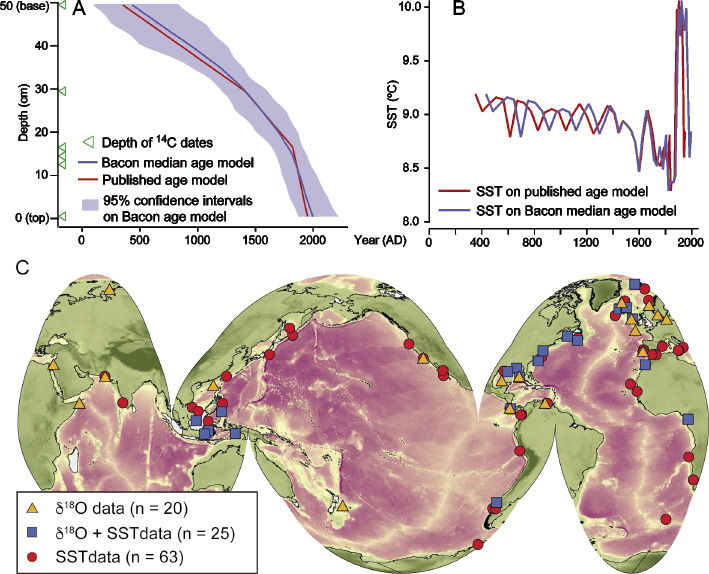- Home
- Publications
- PAGES Magazine
- Data, Age Uncertainties and Ocean Δ18O Under The Spotlight For Ocean2k Phase 2
Data, age uncertainties and ocean δ18O under the spotlight for Ocean2k Phase 2
McGregor HV, Martrat B, Evans MN, Thompson D, Reynolds D, Addison J & Workshop Participants
Past Global Changes Magazine
24(1)
44
2016
Helen V. McGregor1, B. Martrat2,3, M.N. Evans4, D. Thompson5, D. Reynolds6, J. Addison7 and Workshop Participants8
1st Ocean2k workshop, Barcelona, Spain, 6-8 October 2015
The oceans make up 71% of the Earth’s surface area and are a major component of the global climate system. They are the world’s primary heat reservoir, and knowledge of the global ocean response to past and present radiative forcing is important for understanding climate change. PAGES’ Ocean2k working group aims to place marine climate of the past century within the context of the previous 2000 years (2k). Phase 1 (2011-2015) focused on constraining the forcing mechanisms most consistent with reconstructed sea surface temperature (SST) over the 2k interval (McGregor et al. 2015; Tierney et al. 2015). The 1st Ocean2k workshop assisted in the transition to Ocean2k Phase 2 (2015-2017), with the workshop goal to develop, coordinate and significantly advance community-identified and -driven activities.
A novel pre-workshop proposal process generated over a dozen ideas for Phase 2, which were then refined at the three-day workshop to three themes of broad interest to the Ocean2k community: metadatabase modernization, quantifying and reducing marine record age model uncertainties, and understanding patterns of global ocean δ18O. In addition, a series of sub-themes with distinct foci emerged.
Metadatabase modernization
Expanding on the crowd-sourced development of the Ocean2k metadatabase (www.pastglobalchanges.org/ini/wg/ocean2k/data), this theme will facilitate submission of datasets to public archives and integrate the metadatabase with the LiPD (McKay and Emile-Geay 2016) and SESAR/EarthChem initiatives (http://earthcube.org/group/marine-annually-resolved-proxy-archives). These initiatives will advance synthesis activities within Ocean2k, PAGES 2k working groups, and with scientists globally.
Age model uncertainties
This theme will apply uniform age model calibration techniques to records in the Ocean2k network, and re-examine their age uncertainties to improve the description of marine climate patterns in space and time through the 2k interval. Preliminary analysis suggests that different techniques can result in age model shifts of ±85 years (4.25% age uncertainty; Fig. 1a-b), making it difficult to identify multi-decadal variability in the marine realm. But, at the centennial scale, a standardized 14C calibration methodology could better constrain the timing of common spatial variability and reduce temporal uncertainty estimates.
Ocean δ18O
Ocean2k Phase 1 identified numerous individual coral and foraminifera SST reconstructions covering some or all of the past 2k, and many of these have associated δ18O measurements (Fig. 1c). The ocean δ18O theme will bring these marine SST and δ18O records together to document the first order spatio-temporal patterns of global ocean δ18O and investigate the ocean hydroclimate, salinity signals, and circulation changes of the past 2000 years. Results will be compared with realistically forced simulation (isotope-enabled where possible) and the theme will run in conjunction with the PAGES 2k trans-regional project Iso2k.
Additional themes
Additional sub-themes will explore the ENSO and teleconnection signals identified in the Phase 1 analysis (Tierney et al. 2015); investigate spatio-temporal AMOC dynamics; synthesize Mediterranean Sea records to investigate North Atlantic influences on the Mediterranean climate for the Little Ice Age and Medieval Climate Anomaly; and evaluate the oceanic response to volcanic forcing seen in proxy and model reconstructions with simulated post-eruption climate features.
Join us
The workshop was the first in-person meeting of the Ocean2k working group after over four years of productive, consensus-driven collaboration (Evans 2015), and we invite you to join the project. See www.pastglobalchanges.org/ini/wg/ocean2k/intro for additional information, or please contact the new overall lead of the working group, Helen McGregor. We thank the CosmoCaixa Natural Science Museum for hosting us and facilitating our successful outreach event, attended by over 100 high school students.
affiliationS
1School of Earth and Environmental Sciences, University of Wollongong, Australia
2Department of Environmental Chemistry, Spanish Council for Scientific Research, Barcelona, Spain
3Department of Earth Sciences, University of Cambridge, UK
4Department of Geology and Earth System Science Interdisciplinary Center, University of Maryland, College Park, USA
5National Center for Atmospheric Research, Boulder, USA
6School of Earth and Ocean Sciences, Cardiff University, UK
7U.S. Geological Survey, Menlo Park, USA
8In-person and virtual, www.ocean2k-bcn2015.org/contributions/participants
contact
Helen McGregor: mcgregor uow.edu.au
uow.edu.au
references
Blaauw M, Christen JA (2011) Bayesian Anal 6: 457-474
Evans MN (2015) "Virtually" Ocean2k, Future Earth
Keigwin LD et al. (2003) Clim Dyn 21: 53-62
McGregor HV et al. (2015) Nature Geosci 8: 671-677
McKay NP, Emile-Geay J (2016) Clim Past 12: 1093-1100
Tierney JE et al. (2015) Paleoceanography 30: 226-252


